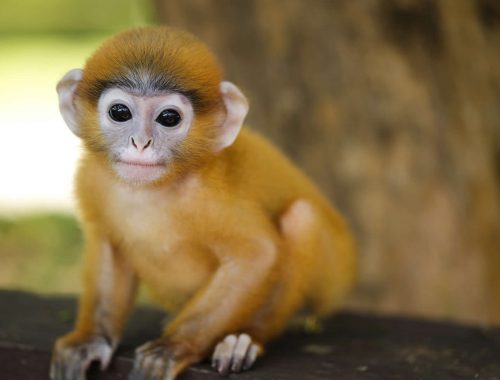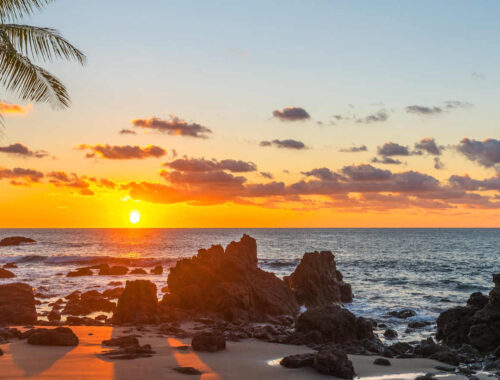
Wildlife sanctuary volunteering in Ecuador
Make the Amazon rainforest your home as you help to care for rescued animals in an amazing wildlife sanctuary. Work with over 200 animals from monkeys to forest cats, from birds to caimans, and from tortoises to rodents. If that’s not enough, get exploring in your free time, with the Amazon Rainforest and the Adventure Sports Capital of Ecuador just on your doorstep!
Duration: 2 – 12 weeks
Dates: Throughout the year
Arrival day: Sunday
Return day: Sunday
Eligibility: General level of fitness required
Age: 17+
Share with friends...
Highlights
- Feed an Amazonian big cat, catch fish for a caiman and listen to the cheeky monkeys chattering
- Jump into the pool to freshen up after a hot day in the rainforest – bliss!
- Visit a remote Amazonian ecological reserve, the release site for many of the rescued animals
- Get adventurous in your free time with white water rafting, zip lines, bungees and thermal baths
- Add a conservation career course to support and apply for jobs after your trip
Hear the birds calling, watch the monkeys playing, and experience first-hand the new life that these rescued animals have been given. The animals come from a variety of backgrounds, such as having been kept in zoos or illegally as pets, knocked over in traffic accidents or smuggled in the illegal pet trade. Where possible, these animals will be rehabilitated to the wild, however sadly this cannot be the case for all of them.
The sanctuary spreads through about 8 hectares of beautiful woodland, providing a bright and natural environment for about 35 different species. Volunteers become fully immersed in life at the sanctuary, gaining experience of working in animal care that is second to none. You may also have the opportunity to visit the wild release site whilst volunteering in Ecuador, especially if a release is imminent.
The animal care tasks can include, but are not limited to:
- Food preparation: chopping up food, dispensing vitamins and providing nourishment
- Feeding rounds: walking the sanctuary to give food and water to the rescued animals
- Cleaning: making sure that the enclosures are clean and habitable
- Enrichments: help to create enrichments which allow the animals to develop their instincts
- General maintenance: this could be building enclosures, painting enclosures or doing basic DIY
- Monitoring animal behaviour: making sure that animals are adapting well to their new surroundings
- Preparing for release: Making sure that the animals and the release site are ready before the release
- Cooking duty: food is provided by the sanctuary however volunteers muck in to help with cooking
- Cleaning duty: help to keep your living areas clean
Are you looking for paid work in the conservation sector after volunteering or interning? Oyster have teamed up with our friends at Conservation Careers who support people to find paid work in conservation following study or a career change. You can add their fantastic and flexible course to your volunteering trip with Oyster. Your Oyster experience will help add interest to your conservation resume as an eye catching addition to your job applications in future!
- Live in basic and comfortable log cabins in the centre of the sanctuary
- Rooms have bunk beds and 4 – 6 people share each room
- The cabins share a toilet and shower block which volunteers are responsible for maintaining
- The showers have hot and cold water
- Limited WiFi access between certain hours
- Swimming pool on-site
- Large living area with hammocks, seating and dining facilities
- Food is provided during the week, but not at weekends
- There is a large and well-equipped kitchen for weekend cooking
- Breakfast buffet of bread, toast, spreads, butter, fruit etc
- Lunch and dinner largely consist of rice, pasta, potatoes, meat, fish, vegetables and salads
- Some volunteers choose to supplement their food with dessert, drinks and snacks
- Dietary requirements can be catered for, however your options may be more limited
Learn Spanish remotely before you travel with our wonderful Oyster representative in Ecuador, Monika. Monika is a qualified teacher of Spanish and for many years she has been helping volunteers to improve their Spanish abilities. She is happy to teach any level of Spanish ability, from complete beginner to someone who has a good grasp of the language.
Price guide and details:
- Whatever your ability, Monika will tailor a teaching programme around you
- Lessons are mainly based around what would be useful for life as a volunteer in a Spanish-speaking country, although can be amended to your preferences
- Lessons are conducted online and you must have access to a laptop and internet connection
- Lessons are 2 hours each and take place twice per week
- Lesson scheduling is flexible around your availability. Monika is available between 11am UK time and 2am UK time each day.
- 8 hours of teaching (2 weeks of lessons): £150
- 16 hours of teaching (4 weeks of lessons): £275
- 24 hours of teaching (6 weeks of lessons): £400
- 32 hours of teaching (8 weeks of lessons): £525
If you are interested in learning Spanish with Monika, please let us know on your booking form.
Travel arrangements
Airport: Quito (UIO)
Arrival day: Sunday. Collected from the airport and overnight stay in Quito. Transfer to the project on Monday
Departure day: Sunday
Supporting You

Monika has been welcoming international volunteers to Ecuador since 2006. She speaks fantastic English, and is a wonderful friendly face for your arrival to your new temporary home. She is passionate about wildlife, cooking and travel – you will get to enjoy her cooking whilst you are in Quito! She is originally from Colombia, but Ecuador has been her home for over 30 years.
Included
- Access to your own personal ‘My Oyster’ account – our online portal where you can find out much more about the program and manage your booking
- Dedicated contact time with an experienced destination manager to discuss the project, answer any of your questions and for us to find out more about you
- Help and advice from our UK office before arrival and whilst you are away
- Pre-departure information covering medical, safety and project advice
- Gold level, 24/7 Pharos crisis management and incident support cover
- Financial protection: ATOL (if we book your flights).
- Thorough orientation on arrival
- In-country support
- Accommodation (see the ‘accommodation’ section above for details)
- Advice on visa requirements
- Oyster plants a tree in Africa with TreeAid to help reduce the impact of global carbon emissions
- Transfer from Quito airport to your first night accommodation
- First night accommodation in Quito – dinner and breakfast included
- Transfer from Quito accommodation to the sanctuary
- Food on weekdays
- Free wifi at the sanctuary (may be slower and patchier than you are used to!)
- A local SIM card (make sure your phone is unlocked)
- Donation to the project
On your return:
- Welcome home pack
- Certificate of Recognition (on request)
- References (on request)
Not Included
- Flights – as an ATOL bonded company, Oyster can book flights for you
- You need a valid passport that meets the requirements of the country you will be travelling to
- Insurance (covering your time with Oyster and any planned independent travel)
- Any costs associated with changing your return flight date if you need to
- Independent travel costs
- Home country travel costs
- Spending money for additional trips, food and entertainment
- If you will be flying through the USA you need to comply with US regulations- make sure you have an ESTA (Electronic System for Travel Authorization) at least 72 hours before you leave
- Food costs at weekends
- Return transfer to Quito and onward travel- from £25.
More Information
This is a great opportunity for those who love animals to make a genuine difference. The project allows you to get stuck in with all that is involved with running the sanctuary and with the care of the animals. There is a fun and positive atmosphere, with lots of people who have come together to help in something that they are passionate about.
If that isn’t enough, you will get to see and learn about some really amazing animals. It is a pleasure to see them in their natural environment, and know that all you are doing is helping for them, and others, to have a better life.
This is a great experience for anyone with an interest in animal welfare; whether you are taking a holiday with a difference, an intrepid gap year or a career break, this project offers great scope for learning and contributing.
Each day offers something new and different, but a typical day can follow this structure:
Breakfast: 07.00 – 08.00
Morning tasks: 08.00 – 12.00
Lunch: 13.00
Afternoon tasks: 14.00 – 17.00
Dinner: 19.00
The working week is Monday – Friday however you will be expected to work on either a Saturday or Sunday morning as well.
Animals that live in Ecuador and are typically from the Amazon include:
- Tortoises
- Caimans
- Macaws
- Vicuna
- Tapirs
- Howler monkey
- Ocelots
- Parrots
- Dolphins
- Giant otters
- Capybara
- Squirrel monkeys
- Spider monkeys
Whilst late-availability is possible, we would advise booking as soon as you can to guarantee your ideal dates. Our projects are very popular and spaces can fill up several months in advance, especially for the months of June to September.
This is certainly not a “hug an animal” experience. Many of the animals were house pets or have been humanised in some form of capacity, however this sanctuary was created to provide them with a life as close to the wild as possible. Therefore no interaction is encouraged, however some of the smaller animals will come in for some affection, usually the tamarinds. You are not encouraged to interact with the monkeys as they can be very strong, and at times aggressive.
Oyster assesses projects carefully to ensure that they offer high standards of animal welfare and environmental practice. We also check that volunteers understand key points of good practice before working with animals. To find out more, see our animal welfare policy.
Without the volunteers only the basic care for these creatures could be completed, and their environment would be significantly lacking. Wildlife sanctuaries depend on volunteers, both for the excellent work that they do but also for the financial contribution that they bring. For this reason, it is not possible to volunteer in Ecuador for free.
The weather is relatively similar year round in this area of the country, with plenty of rain and warm weather – you are in the rainforest after all! As a general rule, you can expect:
Cooler and wetter season: March – July with temperatures ranging from 15 – 26 degrees celsius, and an average of 400mm of rain each month.
Warmer and drier season: August – February with temperatures ranging from 16 – 28 degrees celsius, and an average of 320mm of rain each month.
Do bear in mind that the sun feels hotter due to your proximity to the Equator. When it is raining, it can feel quite cold, so a few layers and wet weather gear is essential.
Life in Ecuador is relatively inexpensive however we would recommend a budget of about £50 per week to cover weekend food costs, outings, travel into town and return travel to Quito.
There is really easy access to cash machines in the local town so you do not need to take all your cash with you.
No visa is necessary for under 90 days from UK and most western European countries. You will receive a tourist stamp upon arrival allowing you stay in the country for free for up to 90 days.
You need to make sure your passport is valid for a minimum of 6 months from your date of entry into Ecuador.
Most of our volunteers are independent travellers and you will become part of a group of people from around the world here. It is fine to travel with friends or as part of a small group too however- more the merrier!
The simple answer to this question is, yes absolutely!
It is important to bear in mind however that this may not be like other holidays that you have taken. Remember that you are volunteering, and this means that you will be put to work! This sort of holiday is a world away from sun loungers and cocktails, with our volunteers often heading home tired but immensely satisfied. If you think that you will need a bit of relaxing time on your trip too, do make sure to factor this in when your time on the project is complete.
You should visit your doctor or travel nurse to find out what vaccinations you will need. Your routine vaccinations will need to be up to date; hepatitis A and Typhoid are likely. Rabies is a possibility. You should follow your doctor’s advice.
See below for where the closest hospital to the project is – your doctor may ask to know this so that they can provide information on rabies.
For more information, please see the UK government’s travel advice page for Ecuador.
There are hospital facilities just 15 minutes from the centre.
The sanctuary is in a very secure and safe area. Accommodation is located on site and the staff live on site as well. The project is located in rural Ecuador, approximately 5 hours from Quito. It is a beautiful and unspoilt area. The local town of Puyo is small and friendly.
You will receive full training regarding working with the animals on arrival at the sanctuary.
The town of Puyo is about 15 minutes’ drive from the sanctuary. It costs just about £3 to travel into town from the sanctuary.
There is limited access to wifi during the day. You are able to access it during your break times and up until 19.00.
There is good phone reception at the sanctuary.
Ecuador is 5 hours behind GMT (GMT – 5)
Plug sockets are two flat prongs (US and Canada adapter).
- The sanctuary is located on the fringes of the Amazon rain forest, close to the gateway city of Puyo
- Puyo has numerous bars, restaurants, cafes and shopping centres
- There are lots of jungle tour operators in Puyo that do trips to indigenous communities, hiking, and more
- 90 minutes from the sanctuary is the town of Banos, famed for its thermal baths and adventure activities
- In Banos you can go swimming in hot pools, get spa and massage therapies, do white water rafting, go hiking, enjoy cycling and take on canyoning
- You will be working Monday – Friday and EITHER Saturday morning OR Sunday morning.
- It will be decided each week which weekend shift you will take.
- Evenings are free
Supervision will be fairly intensive during the first few days, when you will receive a thorough induction and work-related training. Once you are comfortable with things, you might not always have a supervisor working alongside you, but there will always be staff and other volunteers around to help, and you will always be accompanied for any high risk activities.
Staff at Oyster’s head office and in-country will be responsible for your safety and welfare while you are at the project. This will start from the moment you are picked up from the airport until the day that you leave at the end of your project stay. Before and after these times, you will be outside Oyster’s responsibility and should make sure that you act safely and avoid risk. This is also true if you choose to leave the project during your time off. We will give you plenty of guidance and advice about this.
Please note, in contrast to your time on the project, whilst you are in Quito you will not be under direct supervision. We expect you to make sensible choices and follow our advice on staying safe.
Oyster has personally hand-picked some of the best volunteering projects out there. With so much amazing choice, it can be hard to make a decision. Our Animal Welfare Destination Manager, Anne, has written a guide to help you to choose the best animal volunteering project for you.
We are an approved activity provider for the Duke of Edinburgh’s Award. You are able to put the time that you spend volunteering abroad on this project towards achieving your Gold Duke of Edinburgh’s Award. We are happy to sign off your completion of this programme to show that you have achieved the Residential section of the Gold Award.
Project Reviews
Find out what Oyster volunteers have said in these reviews of the volunteering on the wildlife sanctuary programme in Ecuador. To find out more about this project, visit our wildlife sanctuary page.
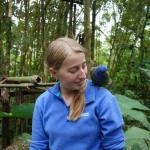 "I can’t believe I’m nearly halfway through my trip al...
"I can’t believe I’m nearly halfway through my trip al... Got a question or want to chat to Project Manager Kate who has first-hand experience of the project? Call +44 (0) 1892 771 973or email: – [email protected].









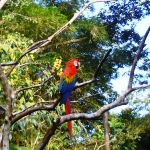 "I just wanted to share how absolutely fantastic my trip was. It was filled with amazing experiences that I’ll never forget. One of the highlights was having the opportunity to train some of the animals, including a Tyra, which was an incredible learning experience. I also worked closely alongside the vet nurse, helping to support an unwell kinkajou—a truly rewarding moment that deepened my passion for animal care.
Beyond the hands-on experiences, I had some wonderful dinners with the people I met during my stay, and we created lifelong memories together. The connections I made with both the animals and the people have left a lasting impact, and I genuinely feel I’ve made friends for life.
All the transport arrangements were seamless, and I couldn’t have asked for a better experience. I’m already looking forward to returning, hopefully within the next year! Thanks again for making this all possible."
"I just wanted to share how absolutely fantastic my trip was. It was filled with amazing experiences that I’ll never forget. One of the highlights was having the opportunity to train some of the animals, including a Tyra, which was an incredible learning experience. I also worked closely alongside the vet nurse, helping to support an unwell kinkajou—a truly rewarding moment that deepened my passion for animal care.
Beyond the hands-on experiences, I had some wonderful dinners with the people I met during my stay, and we created lifelong memories together. The connections I made with both the animals and the people have left a lasting impact, and I genuinely feel I’ve made friends for life.
All the transport arrangements were seamless, and I couldn’t have asked for a better experience. I’m already looking forward to returning, hopefully within the next year! Thanks again for making this all possible."
 "I had the best time ever during my two week stay in the animal sanctuary in Ecuador. The oyster world team were also very accommodating to me, as I was planning on changing my trip due to currents news of Ecuador and they helped me every step of the way. I eventually went with my original dates and am very glad that I did. The experience itself is one I will never forget and I did not expect to be able to work in such close proximity to the animals without feeling micromanaged, and I felt I was doing meaningful work. I had no previous experience with animals but this was not an issue as everything was explained very well. It was one of the highlights of my life. The experience overall was a 10/10, it was very tough work especially as we had less volunteers than usual, but it is a time I will never stop talking about."
"I had the best time ever during my two week stay in the animal sanctuary in Ecuador. The oyster world team were also very accommodating to me, as I was planning on changing my trip due to currents news of Ecuador and they helped me every step of the way. I eventually went with my original dates and am very glad that I did. The experience itself is one I will never forget and I did not expect to be able to work in such close proximity to the animals without feeling micromanaged, and I felt I was doing meaningful work. I had no previous experience with animals but this was not an issue as everything was explained very well. It was one of the highlights of my life. The experience overall was a 10/10, it was very tough work especially as we had less volunteers than usual, but it is a time I will never stop talking about."
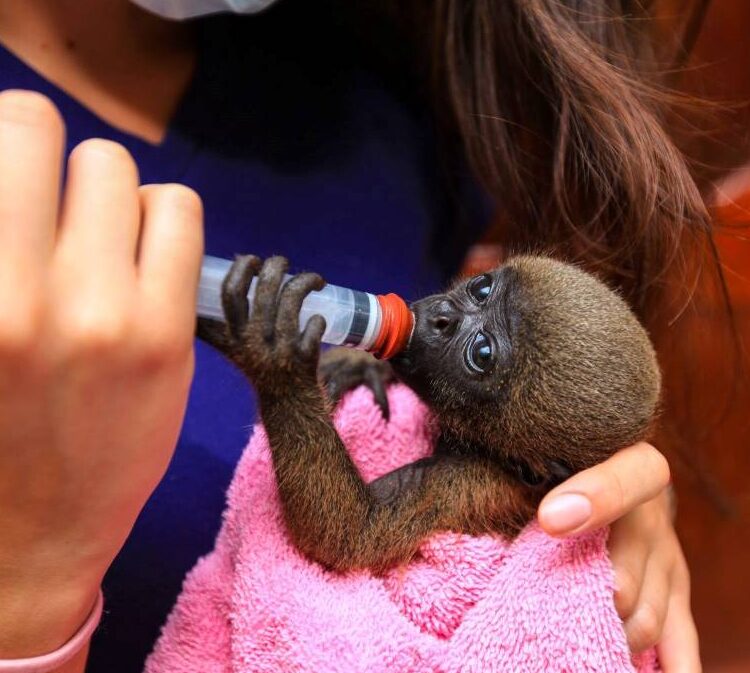 "I'm doing great, I'm really enjoying my time here. The work can feel like a lot with the heat and humidity, but the payout of the animal's welfare is worth the effort. Thank you!"
"I'm doing great, I'm really enjoying my time here. The work can feel like a lot with the heat and humidity, but the payout of the animal's welfare is worth the effort. Thank you!"
 "Fantastic experience getting to interact with the rescued primates!"
"Fantastic experience getting to interact with the rescued primates!"
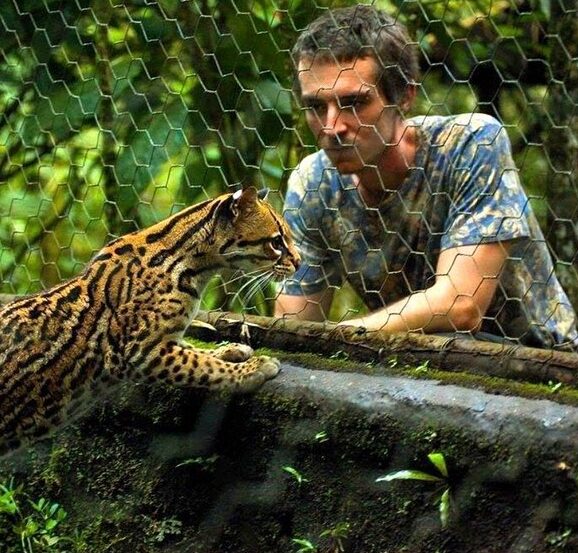 "I had a wonderful time in Ecuador. As of now, I have extended my travel and am currently on a two week vacation in the Galapagos. Thank you so much for the guidance and help during my stay. It felt safe having someone watching my back!! ECUADOR
"I had a wonderful time in Ecuador. As of now, I have extended my travel and am currently on a two week vacation in the Galapagos. Thank you so much for the guidance and help during my stay. It felt safe having someone watching my back!! ECUADOR 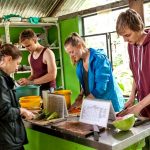 "My first week was absolutely brilliant. I am loving the work, the animals, the scenery, the location, the people and even the weather. Tomorrow we are going to the reserve to release some animals that are good to go; a tree porcupine and two turtles."
"My first week was absolutely brilliant. I am loving the work, the animals, the scenery, the location, the people and even the weather. Tomorrow we are going to the reserve to release some animals that are good to go; a tree porcupine and two turtles."
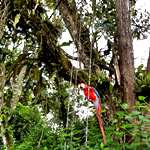 "Some of the animals had been rescued from the illegal pet trade, and so were very used to humans. There was a nocturnal monkey and a squirrel monkey, for example, who were very friendly, and liked sitting on people’s shoulders. It was also amazing to actually see and interact with animals I had learned so much about, like the spider monkeys and ocelots. "
"Some of the animals had been rescued from the illegal pet trade, and so were very used to humans. There was a nocturnal monkey and a squirrel monkey, for example, who were very friendly, and liked sitting on people’s shoulders. It was also amazing to actually see and interact with animals I had learned so much about, like the spider monkeys and ocelots. "
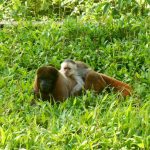 "I knew the sanctuary was excellent from the research I made in advance, but experiencing it was definitely something different.I have a lot of respect for all the people that contribute in the effort to combat these issues, the staff at the santuary and Oyster for giving people the opportunity to help too. Excellent contact with Anne and Monika and my great thanks to both!"
"I knew the sanctuary was excellent from the research I made in advance, but experiencing it was definitely something different.I have a lot of respect for all the people that contribute in the effort to combat these issues, the staff at the santuary and Oyster for giving people the opportunity to help too. Excellent contact with Anne and Monika and my great thanks to both!"
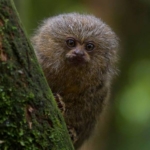 "It was honestly amazing and I don’t regret a second of it! I recommend for people to travel aboard and experience the things I did, and you’re never really too old! I do miss Ecuador a lot! It was a beautiful country and I wish I had more time to travel. Thanks a bunch for your help with this experience Anne! I have memories I’ll never forget!"
"It was honestly amazing and I don’t regret a second of it! I recommend for people to travel aboard and experience the things I did, and you’re never really too old! I do miss Ecuador a lot! It was a beautiful country and I wish I had more time to travel. Thanks a bunch for your help with this experience Anne! I have memories I’ll never forget!"
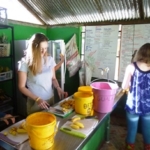 "The volunteering itself was exceptional. I met the most wonderful people and had an excellent time. I felt supported by Oyster before, during and after my trip."
"The volunteering itself was exceptional. I met the most wonderful people and had an excellent time. I felt supported by Oyster before, during and after my trip."
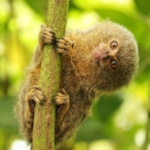 "I'm absolutely loving it here! The staff are all incredibly friendly and I've had so many great experiences here that I never thought I'd get to do, and have seen so many animals that I didn't even know existed."
"I'm absolutely loving it here! The staff are all incredibly friendly and I've had so many great experiences here that I never thought I'd get to do, and have seen so many animals that I didn't even know existed."
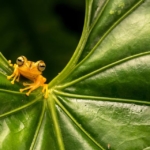 "Thank you so much for all your help getting us here! Daisy and I are having the most incredible time here, we are absolutely loving everything about it! The staff here are so kind and helpful and the animals are awe-inspiring to see, I would absolutely recommend this project to any animal lover."
"Thank you so much for all your help getting us here! Daisy and I are having the most incredible time here, we are absolutely loving everything about it! The staff here are so kind and helpful and the animals are awe-inspiring to see, I would absolutely recommend this project to any animal lover."
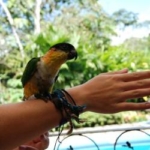 "Everything is great! The staff are very knowledgeable, sometimes the work is difficult though. We have been into town a few times to be a part of the carnival activities, such as seeing the parade, enjoying ice cream and being sprayed with foam and paint! The place is amazing, and Ecuador is fantastic also"
"Everything is great! The staff are very knowledgeable, sometimes the work is difficult though. We have been into town a few times to be a part of the carnival activities, such as seeing the parade, enjoying ice cream and being sprayed with foam and paint! The place is amazing, and Ecuador is fantastic also"
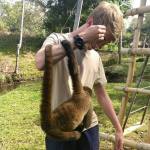 "Finally come to the end of my four weeks of volunteering here... Met a lot of really cool animals and people and it's been a pleasure working with them all, from building climbing frames and releasing a snake back into the wild, wouldn't change a minute of it..."
"Finally come to the end of my four weeks of volunteering here... Met a lot of really cool animals and people and it's been a pleasure working with them all, from building climbing frames and releasing a snake back into the wild, wouldn't change a minute of it..."
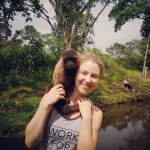 "The first week was great and I've experienced so much, I'm still in disbelief about it. Tonight, I'm on nocturnals for the first time and really excited about it."
"The first week was great and I've experienced so much, I'm still in disbelief about it. Tonight, I'm on nocturnals for the first time and really excited about it."
